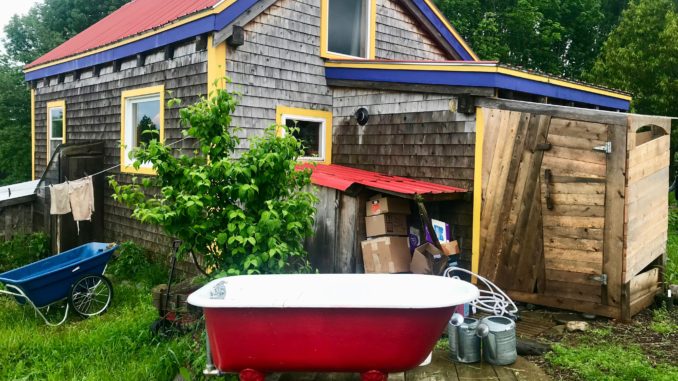
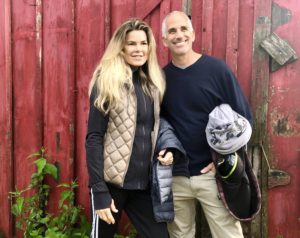
Many Hands Farm in Thorndike, Maine (population 900), is a homestead that holds some mystery for our group.
We park next to a field of summer wildflowers and run the mosquito gauntlet—a path through a hundred yards of forest with a canopy so thick it blocks the evening light. Once on the other side, the six of us joke about hummingbird-sized bugs with stinging superpowers.
We’ve all experienced grand farm-to-table dinners in airy romantic barns across this rural stretch of Mid-Coast Maine. Tonight, we’re going small.
Many Hands Farm is owned by John Palumbo and his partner, Nyla Bravesnow. John is a tall, lean man with a face you might see in a Patagonia print ad. He meets us near the tiny, pine structure where the dinner will be held (thankfully indoors) and invites us to explore the homestead before we sit down.
A wooden heart hangs on the door of a miniature, red barn. A clawfoot tub—perfect for summer bathing—sits in a yard near the little house (all of 432-square-feet) where John’s family of five lives. Save for electricity, they are off the grid.
Three black pygmy goats in a pen stare out at us quite seriously. Their quarters are surrounded by beds of plants, flowers and vegetables.
The Lay of the Land

“We’ve had this place for eight years,” John says. “We’re both Waldorf school teachers but we wanted a different life. We built a couple of cabins to rent on Airbnb but that didn’t work so we’re trying something new.”
One of those cabins is now a dining hall. Here, the word “hall” does not connote grandness. Instead, the space is cozy and intimate, a compact 12-by-15-foot room. The unfinished pine boards John used to build it are glowing golden in the evening sun.
A long table—made from cherry and birch trees John felled with an ax—and hand-hewn benches are the only furniture. Behind a curtain is a sawdust composting toilet. Surprisingly, odor is not an issue.
“Thirteen is the most we’ve ever done in here,” says John, as we sit down elbow to elbow with other diners who’ve made their way through the forest.
The closeness ensures connection. To my right is an artist dressed in a colorful Peruvian skirt and embroidered shirt. She farms 130 nearby acres. To my left is my husband, Ethan, a Los Angeles native with no green thumb but an appreciation of healthy, home-cooked meals.
“I had to come all the way to Maine to try Indonesian food,” he jokes to the couple from Florida sitting across from him.
Many Hands prices its farm-to-table dinners on a sliding scale—$35, $45 or $55—depending on what people feel they can afford. Sometimes John and Nyla barter—a dinner in exchange for something they need.
This Friday is Indonesian Night. Nyla cooks on a one-burner, plug-in plate and a wood stove. It seems a smart choice since much of Indonesian cuisine is served cold.
“Everything we do is extremely local, straight from our farm or from a friend’s farm,” John says. “Even the milk and tofu.”
The menu at Many Hands Farm
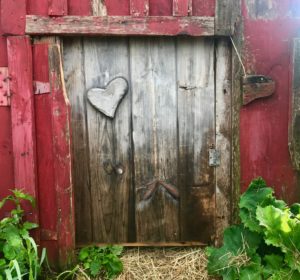
The six-course meal is served in small dishes by the couple’s three sons—Jonah, 12, Ara, 7, and Kai, 5. The most adorable waiters I’ve ever seen place Gado-Gado (crisp steamed vegetables in peanut sauce) in front of guests and teach us to say “thank you” in Indonesian.
With the Oseng Oseng (carrot stir fry) they teach us to say “hello,” and with the Semur Terong (sweet eggplant stew), “goodbye.”
Many Hands is not a place you leave stuffed, but the offerings provide a sense of extreme nourishment, as if I’m doing my body a solid. Even more interesting to this city girl, who automatically thinks wine when it comes to food, there is no alcohol on the table. John had assured his guests they were welcome to bring it. Nobody did.
Nobody picks up their smart phone either. And so, we are all present to watch the dark storm clouds creep over the gentle rise behind the farm. And to listen to the rain that patters suddenly on the roof.
When the storm clears as suddenly as it came, it leaves a bright rainbow in its wake.
“To produce income from something that’s meaningful and brings joy,” John says, describing his and Nyla’s goal of working their land in a way that inspires. “To do something beautiful with simple things.”
Maine’s brutal winters don’t lend themselves to outdoor work, so the couple must maximize productivity during the other seasons. These dinners are also a way to foster community.
“I’ve been here nine times,” says a woman from the nearby town of Belfast, Maine. “I want to support them. I want them to flourish.”
The delicious dinners are also a way for John and Nyla to live their dream of leaving the smallest carbon footprint possible.
For dessert: A Sense of Peace
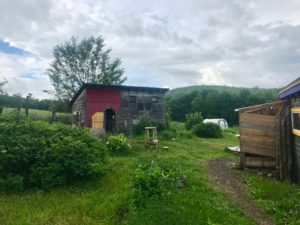
The kids serve Sambal Goreng (fried tempeh in Tomato Sambal) and then finish off the night with soft custard cake and fresh berries.
The boys are telling us about a wooden toy their dad has made them.
“Do you guys like Legos?” I ask suddenly, thinking of the large bin I have at home filled with blocks that my two sons no longer use.
The kids look at each other uncomfortably. “We don’t do plastics,” John says. My cheeks flush. “Do I have to kick you under the table?” my friend Jennifer asks, and the whole table laughs.
The stars are out in force when we head back toward the mosquito gauntlet. John and Nyla’s house is dark. The boys are in bed and fast asleep. Or so I think.
“Terima kasih,” little Kai says as we walk by—“thank you.”
I think about the world of Big Macs, big business, and big-city stressors and make a silent promise to keep the aura of Many Hands Farm alive. To be stored inside for a future time when the world looms too large.
“How do you say goodbye in Indonesian, again?” I ask, softly, in the still night. “Jumpa lagi,” comes the response. When I get home, I look it up. What it means is: Hope to see you again. J&J
(As a print and television journalist, Suzanne Rico has covered everything from the 9/11 World Trade Center attack to the slow-speed sport of curling. She currently splits her time between Maine and California, traveling as often as possible to wherever the landscape is interesting and the airfare is cheap.)
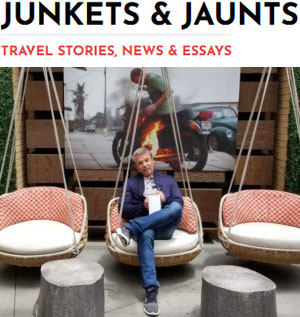
Be the first to comment